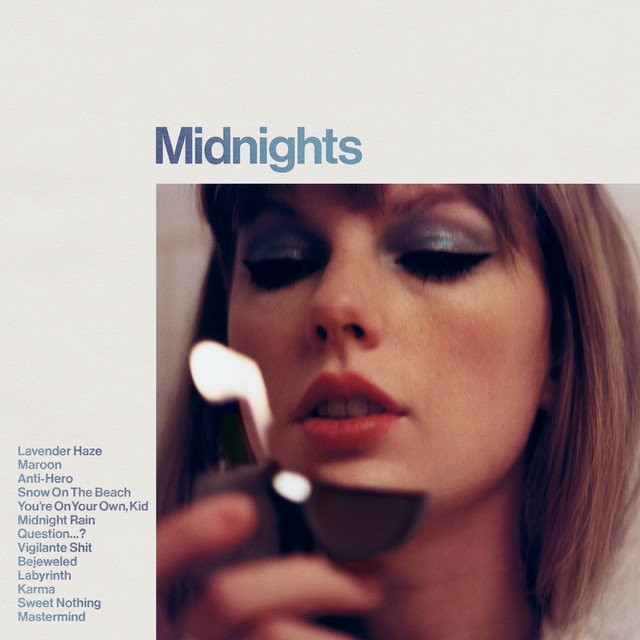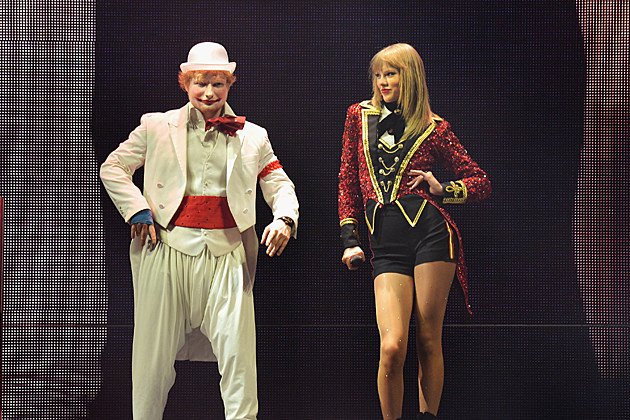Album Review: Taylor Swift, ‘Midnights’
Taylor Swift is the best kind of pop star because she is so aware of the simultaneous frivolity and vitality of the whole affair. Over the past decade, the century’s biggest pop star prioritized reinvention. The bombastic pure pop of 1989 gave way to the blaring, relative edginess of reputation which, in turn, ceded the floor to the inconsistent bubblegum breeze of Lover. The pandemic-rooted isolation of 2020 birthed a pair of career-best efforts by the name of Folklore and Evermore; two folksy forays into a forest of fictional narratives, self-mythology, and sprawling interconnected storylines.
For the past two years, Taylor has been revisiting her past. The ingenuity and vulnerability of the vault tracks on Fearless (Taylor’s Version) and Red (Taylor’s Version) added a layer of introspection to the shady politics that forged the existence of those re-recordings. Delving into not just her vault, but also her psyche during the creation of those projects gave way to the art of reflection that grounds Midnights, Taylor’s tenth studio album. Joined by longtime collaborator Jack Antonoff, as well as some new additions in Sounwave, Zoë Kravitz, and Lana Del Rey, Taylor eschews the novel-esque songwriting bent of her last two albums in favor of something more akin to a short story collection.
The album’s thirteen tracks chronicle “the stories of 13 sleepless nights” scattered throughout Taylor’s life. She revisits the wounds of old relationships as if she’s tracing her finger along an old scar, lays bare her endless battles with how the world perceives her and how she perceives herself, and considers the simultaneous opposition and interconnectedness of Taylor Swift the Person and Taylor Swift the Cultural Entity. It’s a spotty record that tries to blend the intricate lyricism of Folklore and Evermore with her 2010s pure pop troika, but the soundscape Jack Antonoff has created is far too drab and droning to make the mixture work. Sonically, Midnights attempts to convey the downcast glow of those bittersweet wee hours. Lightweight synths and an overall sparse haziness find Taylor attempting a different shade of pop that she had only dabbled in previously (“Dress”; “The Archer”), but the songs largely feel like hollow echoes of some of the sounds on Lorde’s Pure Heroine. Taylor’s return to more traditional pop has reawakened her penchant for melodrama and tongue-in-cheek comedy, but those lyrical predilections are flattened by the sameness of the album’s production. Any color or life that she weaves into her lyrics are undercut by Antonoff’s comatose beats. At best, the album achieves its intended balance on songs like “Bejeweled.” At worst, the production is so deflated that it feels as if nothing is there. For the most part, however, Midnights sounds like the soundtrack for an unremarkable Netflix teen dramedy.
Republic
Since “Tim McGraw” and “Teardrops On My Guitar,” songwriting has always been Taylor’s sharpest skill. Midnights features its fair share of lyrics that invite cringes and eye rolls (“Talk your talk and go viral,” anyone?), but those moments never overshadow the album’s more deft displays of her talents. “You’re On Your Own Kid,” the latest addition to Taylor’s illustrious Track 5 club, transports her back to the mind of the teenager who was slowly writing her way into music history. “You're on your own, kid / Yeah, you can face this,” she sings as she realizes that no matter what she does in her quest for love, she will ultimately only have herself. Album standout “Sweet Nothing” features one of the most heartbreaking bridges of Taylor’s career: “Industry disruptors and soul deconstructors / And smooth-talking hucksters out glad-handing each other / And the voices that implore, ‘You should be doing more’ / To you, I can admit that I’m just too soft for all of it.” Co-written by Joe Alwyn, Taylor’s boyfriend of six years, the song is a capsule of vulnerability that doubles as a reminder that these celebrities and artists that we project so much onto are still people at the end of the day. A star of Taylor’s magnitude exists as a cultural touchstone and political lightning rod before any acknowledgment of her actual humanity and personhood. In a way, Taylor Swift The Person becomes a “sweet nothing” in the shadow of Taylor Swift The Cultural Entity. Taylor’s voice flutters across the strings and brass-inflected instrumental with a quiet gravity. She may play into the extravagance of celebrity, but she refuses to let it break or completely define the person she is outside of the circus.
Midnights is at its best when Taylor is having fun. “Anti-Hero,” the record’s Billboard Hot 100-topping lead single, is one of Taylor’s best pure pop songs in some years. The bouncy hook melody provides a bubbly backdrop for Taylor to transform her self-mythology into an unflinching look at her deepest insecurities. “Sometimes, I feel like everybody is a sexy baby / And I'm a monster on the hill,” she muses before crooning “I have this dream my daughter-in-law kills me for the money.” It’s fun, it’s weird, it’s honest — “Anti-Hero” is the peak of Midnights in terms of the album’s efforts to amalgamate the best parts of each of her post-Red albums. Similarly, “Bejeweled” wields sparkly synths to illuminate Taylor’s reflections on nights out on the town to offset her frustration with a lackluster lover. There’s also the excellent Sounwave-produced “Karma” which sits at the intersection of Taylor’s most hilariously absurd lyrics (“Karma is a cat / Purring in my lap ‘cause it loves me”) and one of her more layered vocal performances. She’s facetious, self-aware, and sincere all at the same time. Of course, Midnights also shines when Taylor explores her own mythology. “Maroon” is a natural continuation of “Red” where Taylor squeezes out every last metaphor she can create out of the bloody color, and “Midnight Rain” grants us peeks at her takes on marriage with lyrics like “He wanted it comfortable, I wanted that pain / He wanted a bride, I was making my own name.” Taylor Swift is perpetually perceived as her teenage self, in part, because of her decision to remain unmarried and childless. She makes references to this phenomenon across Midnights (“I'm damned if I do give a damn what people say / No deal / The 1950s shit they want from me”), and it’s these moments that elevate the album to more than just a collection of slightly above average pop songs.
Lover is the most logical point of comparison for Midnights solely because of how inconsistent both records are. For all of the shining moments on Midnights, there are travesties like “Vigilante Shit” — a cheap Billie Eilish knockoff that holds nary a modicum of bite. “Draw the cat eye sharp enough to kill a man” and “I don't dress for women / I don't dress for men / Lately, I've been dressin' for revenge” are so irredeemably hackneyed that they don’t sound like the same writer who delivered the damn near perfect “no body, no crime” just two years ago. “Snow on the Beach,” the album’s sole collaboration which relegates Lana Del Rey to a glorified background vocalist, falls flat with banal lyrics like “And it's like snow at the beach / Weird, but fuckin' beautiful.” The track is already an underwhelming merger of the two ladies’ sounds, and the saving grace is that left-field Janet Jackson All for You reference.
Midnights is not Taylor Swift at her best, nor is it Taylor Swift at her worst. Like the murky midpoint between the rotation of days, Midnights falls somewhere in the middle of Taylor’s discography. While this is clearly an album built for stadiums in the way that its two closest predecessors were not, Midnights unequivocally lacks the punch that made records like 1989 and reputation feel so urgent. It’s a Taylor Swift record, so there are more than a few gems here, but, overall, it’s as inoffensive as it is middling.
Vote for Taylor Swift at the 2023 Bulletin Awards.
Key Tracks: “Anti-Hero” | “Sweet Nothing” | “Bejeweled” | “Karma” | “Midnight Rain”
Score: 70






Every “From The Vault” tack from Speak Now (Taylor’s Version), reviewed and ranked.